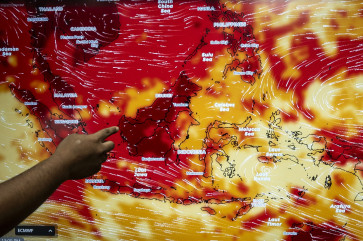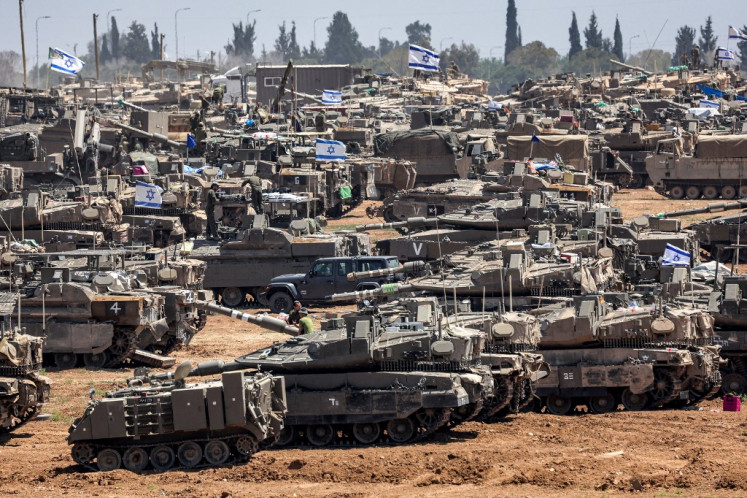TNI helping hand as police keep hold of counterterrorism
The National Police appears to be winning the tug of war against the Indonesian Military (TNI) over control of counterterrorism in the country, although the military has gained President Joko “Jokowi” Widodo’s approval to revive its Joint Special Operations Command (Koopsusgab)
Change Size

T
he National Police appears to be winning the tug of war against the Indonesian Military (TNI) over control of counterterrorism in the country, although the military has gained President Joko “Jokowi” Widodo’s approval to revive its Joint Special Operations Command (Koopsusgab).
In a proposed revision of the 2003 Terrorism Law, the police will maintain a dominant role in both preventive and offensive action against terrorist threats. The House of Representatives and the government are just a few steps away from concluding their deliberations and are expected to pass the revised text into law next week.
The head of the Law and Human Rights Ministry’s National Law Development Agency (BPHN), Enny Nurbaningsih, who also heads the government’s team tasked with deliberating the terrorism bill, said counterterrorism would remain within the realm of law enforcement, and the military would not be directly involved.
“The TNI’s main duties remain as stipulated in the TNI Law. [They] won’t expand to law enforcement,” Enny told The Jakarta Post in a recent interview at her office, adding that the President would regulate the TNI’s involvement through a government regulation.
However, ensuring that the military not gain direct powers in counterterrorism efforts may not be that simple.
Article 43H of the draft, a copy of which has been obtained by the Post, stipulates that the TNI’s role is part of its non-military operations and that the details about its involvement will be regulated under a presidential regulation (perpres), which may open the door for the TNI to once again seek direct involvement.
Enny said the idea to regulate the details in a perpres had come up in a closed-door meeting in March, because the 2004 TNI Law did not stipulate in detail the extent to which the TNI could participate in counterterrorism efforts. The law only mandates that the military’s role depends on political decisions by the government in consultation with the House.
The TNI has been seeking greater powers to safeguard the country against terrorism. Earlier this year, the TNI sent a letter to the House’s special committee tasked with deliberating the bill, suggesting to drop from the bill’s title the words “criminal act”, which imply that counterterrorism falls in the domain of the criminal justice system.
Human rights activists have expressed concerns over a potential abuse of power and over the TNI regaining powers it held under Soeharto’s New Order regime.
The military seems to be backed by factions at the House. Some members of the committee revealed that the Gerindra Party and the Democratic Party — both led by former military generals — had pushed for a specific definition of terrorism to be stipulated in article 1.
They insisted that the bill should define terrorism as acts based on “political and ideological motives and threatening national security”.
The debate over the definition has held up deliberations of the bill.
Terrorism and international relations expert Poltak Partogi Nainggolan said the bill did not require such a specific definition.
“We can never measure people’s ideology or political motives. Besides, if we defined it as ‘threatening national security’ that would pave way for the TNI to take part,” Partogi said.
Gerindra chairman Prabowo Subianto emphasized that it was important to involve the armed forces. “Our military is one of the significant components [in tackling terrorism],” he said recently.
The House is scheduled to continue the deliberation next Wednesday, hoping to reach agreement on the definition and swiftly pass the bill. House Speaker Bambang Soesatyo promised there would no more heavy debates and the bill would pass into law in two weeks.
Jokowi has agreed to reinstate the suspended military’s Koopsusgab to assist the National Police in antiterrorism operations under certain conditions.
The unit comprises of special forces of the Indonesian Military’s (TNI) three armed forces, namely the Army’s Special Forces (Kopassus), the Navy’s Denjaka specialized squad and the Air Force’s Bravo 90 unit.
“The government is in the process of establishing a joint special operations command [...] in order to create a safe and secure environment for the public,” Jokowi said, emphasizing that the special force would be deployed only when the National Police’s capacity was deemed inadequate to respond to an emergency.









